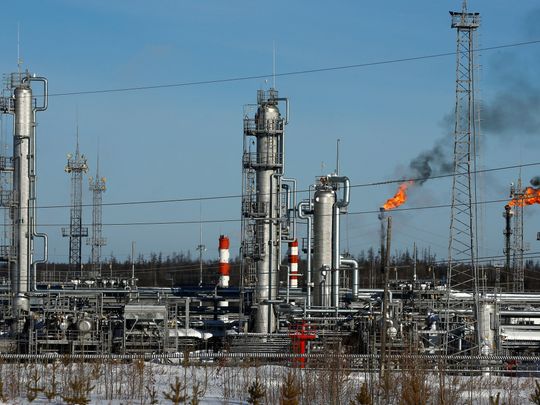
Houston: Oil prices rose above $61 (Dh224) a barrel on Friday after the head of the US Federal Reserve said the central bank will act “as appropriate” to sustain an economic expansion in the world’s biggest economy that has been pressured by uncertainty over global trade.
Global benchmark Brent crude settled at $61.54 a barrel, up 59 cents, or 1 per cent, while US West Texas Intermediate (WTI) crude ended 22 cents, or 0.4 per cent, higher at $56.52.
Both benchmarks had declined earlier on concerns over slipping US job growth and continued US-China trade tensions, despite recent diplomatic progress.
Other forecasts of oil demand growth have been reduced to around 1 million barrels per day (bpd), down from earlier predictions of about 1.3 million bpd, analysts said.
“We’re leaving the US driving season,” said Robert Yawger, director of energy futures at Mizuho in New York. “It’s a very vulnerable position. The biggest worry is concerns about demand growth and that’s a function of the [US-China] trade war.”
The prolonged trade dispute between the United States and China, the world’s second-largest oil consumer, has had a dampening effect on oil prices, though they have risen over the year thanks partly to production cuts led by the Organisation of the Petroleum Exporting Countries and Russia to drain inventories.
Beijing and Washington on Thursday agreed to hold high-level talks in October. The news cheered investors hoping for an end to a trade war that has brought tit-for-tat tariffs between the world’s two biggest economies, chipping away at economic growth.
“If trade tensions escalate further, oil demand growth may soften even more, requiring much lower prices,” Staunovo said, forecasting that Brent will trade around $55 a barrel next year.
Brent posted its fourth consecutive weekly gain, rising 1.8 per cent, while WTI rose 2.6 per cent this week, boosted mainly by Wednesday’s upbeat economic data from China, the world largest oil importer.
WTI had an additional boost this week after the Energy Information Administration (EIA) said on Thursday that US crude inventories last week fell sharply — nearly double expectations — and for a third consecutive week.
Oil prices soared more than 2 per cent after the EIA report, though they gradually fell back on investor doubts over the chances that the trade talks will yield results.
US crude production remains close to weekly record highs, despite a record-tying nine months of cuts in the number of rigs drilling for oil.
US oil companies cut the number of rigs drilling for crude by four this week, bringing the total count to 738, the lowest in almost two years, according to General Electric Co’s Baker Hughes energy services firm.












